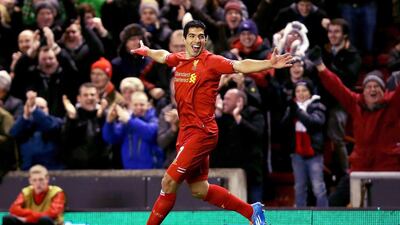Managing Liverpool involves various challenges. Winning a first league title since 1990, for instance, or ending their four-year exile from the Uefa Champions League.
The hardest of all, perhaps, is finding something new to say about Luis Suarez.
Week after week, game after game, manager Brendan Rodgers is confronted with questions about Liverpool’s magnificent
No 7.
Thankfully for the Northern Irishman, only a fraction now are about Suarez’s desire to leave last summer and very few relate to biting Branislav Ivanovic or racially abusing Patrice Evra, the controversies that have marked his past.
Instead, the objective is to find different and original ways of praising Suarez, scorer of four goals, three of them spectacular, against Norwich City on Wednesday, and of 13 in nine Premier League games.
Rodgers has suggested that, should the striker remain at Anfield for most of his career, he could rank among Liverpool’s all-time greats.
He believes that, after Lionel Messi and Cristiano Ronaldo, the Uruguayan belongs in the next bracket of the world’s finest footballers.
He is desperate to prove Liverpool can match Suarez’s ambitions and to ensure others do not tempt his best player to leave.
Yet it was Suarez’s artful destruction of Norwich that prompted some original thinking. The manner of his goals – in particular, the crisply struck opener from 40 yards and the impish decision to juggle the ball over Leroy Fer for the third – had him casting his mind back 20 years.
“I was trying to think back to a game where a player scores a couple of goals like that and the one that hits me was Matt Le Tissier against Newcastle at The Dell,” the manager said. “He scored two absolutely brilliant goals and it stuck with me.”
Le Tissier’s two goals in 1993 for Southampton incorporated a dipping, effortless, inch-perfect effort from distance and a solo run where, instead of taking the ball around an opponent, he knocked it over them and collected his own pass before beating the keeper.
Le Tissier was, unequivocally, a scorer of great goals.
So, too, is Suarez.
He may be developing into a great goalscorer, too. It is a subtle distinction. The men whose finest strikes fill compilation DVDs do not tend to be the poachers, who specialise in quantity rather than quality.
With 36 goals in his last 41 league games, however, Suarez is a flair player who is scoring at the rate of any finisher.
“He is an incredible talent,” Rodgers said.
He has also proved an irrepressible one. In the nine league games since his return from suspension, he has been substituted twice: against West Bromwich Albion, after he had scored three times, and following his four-goal salvo against Norwich, both ploys by Rodgers to afford him a standing ovation. On each occasion, the sense was that Suarez was disappointed to depart the arena early.
The bigger question is when he will exit Liverpool on a permanent basis.
On Wednesday, Suarez indicated that fans can expect a quiet January by pledging to stay until the end of the season. “I am happy and I will stay,” he said.
That is Rodgers’ impression, too. “His behaviour, his mannerisms, his maturity and his performance levels tell me he is very happy here at Liverpool,” the manager said, denying there is an agreement in place to let him leave next summer.
It is not the news overworked defences need. While Daniel Sturridge’s ankle injury means the tandem nicknamed SAS have been separated, Suarez has the capacity to overwhelm them on his own.
With every goal, it is ever harder for Rodgers to come up with a unique comment.
sports@thenational.ae
Follow us on twitter at @SprtNationalUAE


